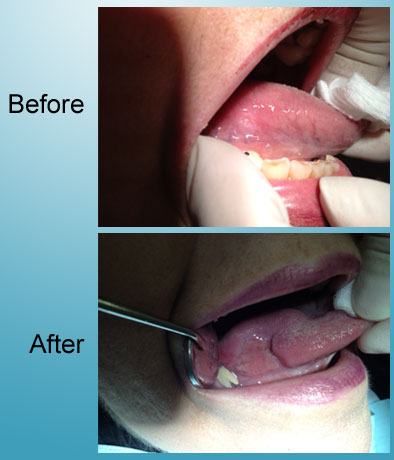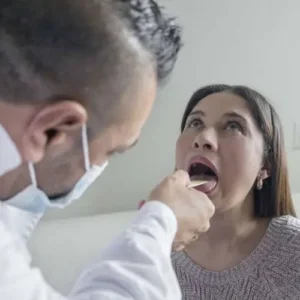Lydia Valdez thought she had a canker sore. The 70-year-old California woman never dreamed the spot on her tongue could be oral cancer.
She didn’t smoke. She had no history of cancer in her family. She didn’t have any of the known risk factors. When she felt a sore spot on her tongue, she thought it was just caused by an old crown rubbing against her tongue.
She hadn’t been to the dentist in a few years. Seventy years old and still working, she had health benefits, but no time. Finally, when she had an appointment with her regular physician, she mentioned the sore. He sent her to an Ear-Nose-Throat specialist, who recommended Lydia see a dentist.

As soon as Coast Dental dentist Dr. John Tchaboukian examined the spot, he suspected it might be cancerous. Dr. Tchaboukian, who has 20 years of experience as a family dentist, recommended Lydia have an Identafi® oral cancer screening test. Identafi uses different light spectrums to detect tell-tale cancer signs, including elevated levels of blood that tumors need to grow. After the exam, Dr. Tchaboukian recommended Lydia have the spot biopsied. The results shocked Lydia: She had Stage 1 oral cancer.
“Even my regular doctor was surprised, because I’m not a smoker,” Lydia said.
The Face of Oral Cancer is Changing
Oral cancer is also known as mouth cancer, tongue cancer, throat cancer, cheek cancer, pharynx cancer and sinus cancer. Consider this:
- More than 37,000 people in the U.S. will be diagnosed with oral cancer this year.
- The fastest-growing at-risk group is sexually-active 25 to 50-year-olds
- Oral cancer has been linked to two strains of HPV, a sexually-transmitted disease
- HPV is expected to lead to more cases of oral cancer than cervical cancer by 2020, researchers say
- About half of oral cancer patients will not be alive 5 years after diagnosis
- With early detection, the survival rate jumps to almost 90%
A lot of times, people don’t realize they have oral cancer. They may think they have a bit of a cold and that’s why they’re hoarse, or they bit their tongue and it’s just taking a long time to heal.
“I let my patients know that it may look like a bite mark, but it needs to get checked,” Dr. Tchaboukian said. “To feel like you’re saving a life, it just makes you feel very good.”
In the early stages, there may be no symptoms at all. That’s why it’s important to have an oral cancer screening.
“I hated going to the dentist, which is why I put it off,” Lydia said. “Even though I have a good job and everything, it had been four years since I had been to the dentist. Fortunately, they were able to catch it early, and it could be removed through surgery. I don’t need any radiation or chemo, I’m able to talk and eat, and I feel good.”
Now Lydia is telling others to get checked. “I thought oral cancer could only be caused by smoking. Now I’m telling everyone they need to go to the dentist. I know I’ll never miss another appointment!”
John Tchaboukian, DDS, provides general dentistry services including crowns, veneers, full-mouth reconstruction, extractions, root canal therapy, periodontal disease management, gummy smile treatment, crown lengthening, dental implant restorations, ridge augmentation, and teeth whitening.
Reviewed by: John Tchaboukian, DDS
Reviewed by: Lydia Valdez
Reviewed by: Cindy Roark, DMD
